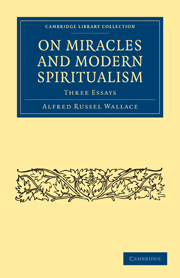Book contents
- Frontmatter
- Contents
- Dedication
- PREFACE
- I AN ANSWER TO THE ARGUMENTS OF HUME, LECKY, AND OTHERS AGAINST MIRACLES
- II THE SCIENTIFIC ASPECT OF THE SUPERNATURAL—
- 1 Introductory
- 2 Miracles and Modern Science
- 3 Modern Miracles viewed as Natural Phenomena
- 4 Od-Force, Animal Magnetism, and Clairvoyance
- 5 The Evidence of the Reality of, Apparitions
- 6 Modern Spiritualism: Evidence of Men of Science
- 7 Evidence of Literary and Professional Men to the Facts of Modern Spiritualism
- 8 The Theory of Spiritualism
- 9 The Moral Teachings of Spiritualism
- 10 Notes of Personal Evidence
- III A DEFENCE OF MODERN SPIRITUALISM
- APPENDIX
- INDEX
8 - The Theory of Spiritualism
Published online by Cambridge University Press: 29 August 2010
- Frontmatter
- Contents
- Dedication
- PREFACE
- I AN ANSWER TO THE ARGUMENTS OF HUME, LECKY, AND OTHERS AGAINST MIRACLES
- II THE SCIENTIFIC ASPECT OF THE SUPERNATURAL—
- 1 Introductory
- 2 Miracles and Modern Science
- 3 Modern Miracles viewed as Natural Phenomena
- 4 Od-Force, Animal Magnetism, and Clairvoyance
- 5 The Evidence of the Reality of, Apparitions
- 6 Modern Spiritualism: Evidence of Men of Science
- 7 Evidence of Literary and Professional Men to the Facts of Modern Spiritualism
- 8 The Theory of Spiritualism
- 9 The Moral Teachings of Spiritualism
- 10 Notes of Personal Evidence
- III A DEFENCE OF MODERN SPIRITUALISM
- APPENDIX
- INDEX
Summary
Many of my readers will, no doubt, feel oppressed by the strange and apparently supernatural phenomena here brought before their notice. They will demand that, if indeed they are to be accepted as facts, it must be shown that they form a part of the system of the universe, or at least range themselves under some plausible hypothesis.
There is such an hypothesis—old in its fundamental principle, new in many of its details—which links together all these phenomena as a department of nature hitherto entirely ignored by science and but vaguely speculated on by philosophy; and it does so without in any way conflicting with the most advanced science or the highest philosophy. According to this hypothesis, that which, for want of a better name, we shall term “spirit,” is the essential part of all sensitive beings, whose bodies form but the machinery and instruments by means of which they perceive and act upon other beings and on matter. It is “spirit,” that alone feels, and perceives, and thinks—that acquires knowledge, and reasons and aspires—though it can only do so by means of, and in exact proportion to, the organisation it is bound up with. It is the “spirit” of man that is man. Spirit is mind; the brain and nerves are but the magnetic battery and telegraph, by means of which spirit communicates with the outer world.
- Type
- Chapter
- Information
- On Miracles and Modern SpiritualismThree Essays, pp. 100 - 107Publisher: Cambridge University PressPrint publication year: 2009First published in: 1875



